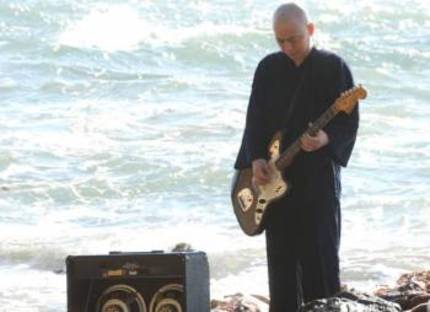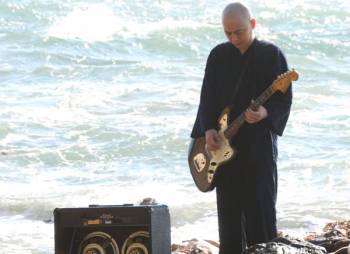PJAM 2011: Boozie Movies finds Zen in punk rock with ABRAXAS!

 What an embarrassing way to start a review, but Naoki Kato's Abraxas harkens back to the profoundly moving and multi- layered, yet minimalist character studies of the great Yasujiro Ozu.
What an embarrassing way to start a review, but Naoki Kato's Abraxas harkens back to the profoundly moving and multi- layered, yet minimalist character studies of the great Yasujiro Ozu.
It's easy for film critics to casually toss around comparisons to Ozu when reviewing or summarizing contemporary Japanese dramas. If a Japanese film isn't about samurais, ninjas, Kaiju monsters, or little girl ghosts with long hair, it's almost an obligatory given that the film will be likened to the work of the master responsible for Tokyo Story, Late Autumn, and Early Spring. It's a cliché. It's lazy writing, but it is also understandable, within the pantheon of Japanese cinema, Ozu is really the only widely recognized point of reference for non-genre related/focused Japanese films amongst Western audiences.
Yet, I can think of no better way to describe the tone of Abraxas. It's a film that deals with incredibly weighty material in such a light, quiet, and nuanced fashion, that everything that plays out on the screen seems almost inconsequential. Abraxas is deceptively simple. Thematically, it shares many of the same ideas that fueled Aronofsky's The Wrestler, and Black Swan, only without the grand theatrics and campy melodrama..
Abraxas opens in a grungy Tokyo dive bar; an unnamed punk band is playing a fierce, soul destroying set. The group's singer, a stringy, wild eyed youth, tears off his clothes jumps into the crowd, and thrashes his way through a small mosh pit like a man possessed, or strung out from a week long bath salt fix.
Cut to 10 years later, and that same punk rocker, named Jonen, has now become a mild mannered, if socially inept Buddhist monk. He has been requested to speak about his profession at a local high school assembly. Facing a crowd of hundreds of disinterested, snarky students, Jonen gets nervous when he takes the stage. His speech is stilted, and awkward. As he continues, his words take on an inappropriately existential bent bordering on the nihilistic. In a sudden and shocking outburst of random violence, Jonen screams into the mic, throws the stand off the stage, and proceeds to spastically pound the keys of a nearby piano. What started as a philosophical manifesto morphs into a full on mental breakdown.
Being a small, suburban town, word quickly spreads of Jonen's erratic and inappropriate behavior leading to much conflict at Jonen's home. His wife must deal with embarrassing public shame at her job with the local grocery market. Meanwhile, the monk falls into a deep depression, alienating himself from others and sleeping in for days at a time until he comes to the conclusion that the only way to find inner peace is to create "music" again and perform before an audience.
Against his wife's wishes, and with the help of the shrine's head monk, Gemune, Jonen sets out to organize a concert.
Much of the film is dedicated to all of the small, peculiar details that go into organizing and promoting a music show in a small suburban town. A simplistic, almost cinema verite slice of life, Abraxas also has much in common with the popular film, Linda, Linda, Linda. Another Japanese film about the healing power of music. On a superficial level, it seems to only be about a group of high school students learning to sing one song, The Blue Hearts' hit of the film's title, but between the lines, Linda Linda Linda is about so much more.
Kato's film succeeds most is when it concerns itself with the genesis of artistic inspiration. It's hinted that Jonen may not be all there. Whether he has a slight form of autism, asperger syndrome, or even a degenerative form of schizophrenia is unclear. Jonen's symptoms of mental illness are vague and undefined, but what is clear is that there's a very strong possibility that his condition may be worsening.
Again, Abraxas is similar to an Ozu or even John Cassevettes film. There is little to no exposition. Writer and director, Naoki Kato lets the story unfold naturally and organically without filling the audience in on the details. There's a lack of context that leads to audience interpretation. How did Jonen meet his wife and what led to him becoming a monk?
Is Jonen an artist, an anarchist punk, or merely deranged?
The film suggests that he's all three and that it's a beautiful thing. Abraxas is also a meditation on the philosophy behind Zen Buddhism. A major part of it is finding beauty in imperfection. Tea ceremony, flower arrangement, these ancient traditions are based on a principle of Wabi-sabi; the literal translation being spiritual-decay. It's important to take the time and notice the cracks in a tea cup and acknowledge their existence as a result of either the artist or time. Jonen was taken in and nurtured by head monk, Genmune, who long knew of Jonen's possible mental illness. Genmune sees that Jonen may not be disciplined enough to be a monk in a traditional sense, but his soul embodies all of the characteristics of a true Buddhist. Jonen finds music in the rattling sounds of a motorcycle's exhaust, in the distortion of a blown amp, and in the sounds of crashing waves.
Jonen's tale also coincides with the death of the shrine's dog, Namu. Genmune celebrates the dog's first day wearing a diaper; it is a sign of the animal's imminent departure, his next life cycle. It also means that the dog is too weak not to shit itself. Again, the film provides a hard and ugly truth in a positive fashion that isn't insulting or patronizing.
And for anyone with a familiarity in Greek mythology and Gnosticism, the film's title references musical inspiration as a source of divine emanations.
While there is a beginning, middle, and end, Jonen's story is far from finished. The film provides only a semi climatic catharsis. Jonen does indeed put on an outdoor concert in the form of a traditional matsuri, and his poppy rock songs later divulge into pure psychedelic noise. It's a scene of electric potency. For anyone with a true passion in music, who feels it rather than just listens to it, it's a powerful moment. Jonen finds his inner peace with the performance, but the lingering question still remains. With only a few lines of heartbreaking dialogue, we realize that everything might not be OK after all for Jonen and his family. He doesn't die of a heart attack or turn into a fucking swan and accidentally kills himself, but he is just as much tortured by his artistic ambitions as the characters in Aronofsky's last two pictures.
Viewers should not be deceived by the film's sluggish pacing and superficially shallow plot, Abraxas is soulful, life affirming, and emotionally devastating in a manner that would make Ozu proud.
Abraxas is playing Thursday, July 7th at the Philly Japanaese Arts Matsuri.
Tickets are available at https://www.ticketturtle.com/index.php?actions=6&p=1







